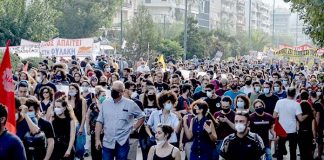The referendum revealed the stark class divide in Greece and a deepening radicalisation of the population.
Virtually the entire Greek ruling class lined up behind a “yes” vote. Former Prime Ministers, a former prince and figures not heard from for years were wheeled out to try to spook voters. Three Independent Greek MPs, part of Syriza’s coalition, broke ranks to back “yes”.
“Far more people support ‘no’ than you would think from watching the TV—where they only show “yes” supporters or the government,” painter-decorator Alkiviados told Socialist Worker. Many bosses tried to blackmail their workers to vote “yes”.
The class divide was particularly evident in the rallies run by both sides prior to the referendum. Whereas the “no” vote was dominated by young and working class people, at the much smaller “yes” rallies fine attire dotted the crowd. One well-dressed man swilling wine at a “yes” rally attracted the ire of Greek social media users.
The overwhelming 61 per cent “no” vote defied an intense scare campaign run by mainstream media and Greek bosses which vigorously exploited the widespread fear that the banking system would collapse.
Costas Pittas, union secretary at the Ministry of Development, said, “The vote came from the working class and poor. The “no” vote was enormous in the poorest suburbs of Piraeus port and in the northern regions where the Turkish minority live.”
The strength of the “no” vote was underpinned by the dedicated activists, socialists and unionists who leafleted, held stalls and campaigned in their communities.
While the Greek media was full of old elites and bosses telling people to vote “yes”, on the streets, posters and graffiti called for a “no” vote.
The clear “no” vote to austerity is testament to the depth of the radicalisation in Greece.
While the democratic will of the Greek people has been rubbished by European leaders and now Syriza itself through agreeing to a new austerity deal, the depth of the anger against austerity is clear.
By Joseph Buckmaster





